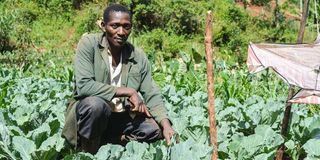Premium
Murang’a farmer urges youth to embrace mixed cropping

David Maina Kamau works on his collar greens on February 2, 2023.
Mt Kenya has the dubious distinction of having a huge percentage of young men being alcoholics or drug addicts yet the region is endowed with fertile soils and good farming weather.
Counties in Mt Kenya are known for producing tea, coffee, milk and meat. Some of those into drugs and liquor move to Nairobi in the hope of getting jobs.
Despite the grim picture, the Seeds of Gold team stumbled on 39-year-old David Maina Kamau in Kigomo village, Gatanga.
The farmer’s home is about a kilometre from Gitiri township on Ndakaini road.
“I realised good life and cash can also come from the soil, instead of going to Nairobi and becoming a hawker,” he says.
“I wanted to be an example to young people. That is why I began mixed farming. Honestly, I have no regrets.”
Kamau plunged into mixed crop farming soon after technical officers from Upper Tana Nairobi Water Fund Trust visited his home.
“They trained me on cheaply building a water pan, harvesting water, wetlands conservation, agroforestry, soil testing and other agronomic practices,” Kamau says.
“I started mixed crop farming in 2021. First, I bought pipes and a pump before building a pan. Then I sank a borehole, which supplies water during dry times.”
Before building the 44-metre wide, 12-metre long and two-metre deep pan, Maina used to grow maize and beans – crops that do not require a lot of water.
“My farm has capsicum, cabbage, tomato, spinach, collard, sukuma wiki and other vegetables. I also grow fruits like avocado, watermelon, tree tomato and banana,” Kamau says.
“At the moment, I have 2,500 cabbage plants, which I sell for about Sh40 a head. I also harvest three crates of tree tomato fruits from my 600 plants every week. A crate can go for as much as Sh7,000. I harvest 100 to 200 kilos of capsicum a month.”
He also fetches cash from a weekly harvest of collard greens.
Terrace ploughing
Kamau adopted terrace ploughing. This is done at right angles as his farm is on a slope.
“The terraces break the flow of water downhill. Tillage is minimal. The fruit trees act as ground cover, stopping soil erosion. One needs to choose plants with strong roots, like avocado, in slopy areas to prevent soil erosion,” he says.
What Kamau gets from mixed-crop farming has enabled him to educate his three children.
“I also bought a piece of land in Meru County and have never applied for the bursary for my children,” Kamau says.
Kamau’s greatest challenge is the high cost of fertiliser and other inputs.
To cut production costs, the farmer uses organic manure and buys pesticides occasionally.
Upper Tana Nairobi Water Fund Trust Conservation Manager, Anthony Kariuki says the company works with more than 50,000 farmers in Nyeri, Laikipia, Muranga and Nyandarua counties.
“We work with farmers as a catalyst, guiding them to take advantage of the opportunities they have. We remain with them for at least 18 months to actualise their plans by taking them through training,” Kariuki says.
“We give the farmers advice on soil testing, rainfall patterns and the right crops to plant. They get technical expertise on making terraces and we provide them with Napier grass. Those farming on riparian lands are advised to plant bamboo and indigenous trees.”
Kariuki says farmers are given training on water-harvesting systems.
“As a fund, we do share the costs in the construction of the pans. The farmers bear the cost of excavation while we provide dam liners,” he says.
“Local farmers who follow our advice have improved their yields and profits. The farmers have solved the problem of water scarcity,” says Michael Muruga a project coordinator with the Ndakaini Dam Environmental Conservation group.





